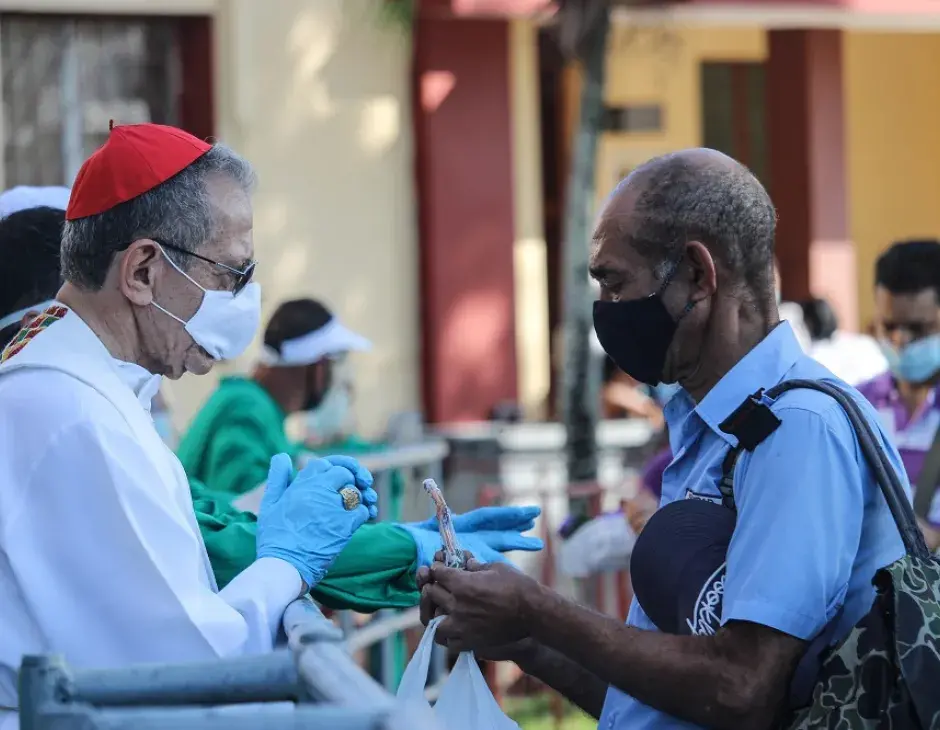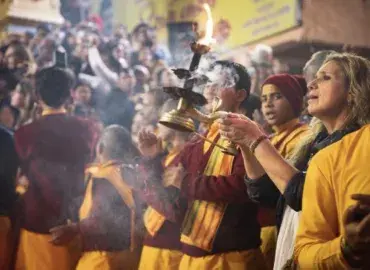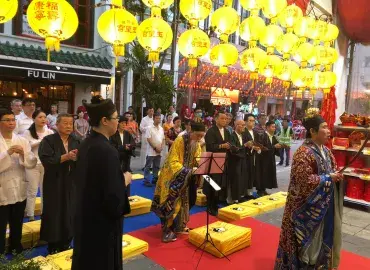During the course of the pandemic, religious leaders have often found themselves on the frontlines of the global health crisis. In addition to adapting rituals to new norms of social distancing and digital worship, religious leaders became humanitarian aid providers, medical responders, and local information experts.
Now, as the world focuses on vaccine rollout and returning to some sense of normalcy in the months and years to come, religious communities and leaders, as with society at large, have to confront challenges posed by mistrust of science or government, vaccine disinformation, and concerns. In some quarters over whether the vaccine aligns with religious values and law.
At an April 2021 workshop for KAICIID Fellows Alumni, Sarah Hess, Sally Smith, and Melinda Frost of the Information Network for Epidemics (EPI-WIN), Health Emergencies Programme at the World Health Organization (WHO) shared their insights on the importance of working with religious communities during the crisis. They also shared some tools and best practices for religious communities to confront this all-embracing global health emergency. The following is adapted from their presentation.
Addressing community concerns
Vaccination aimed at achieving herd immunity is clearly the most pressing issue facing the global community right now, says Sally Smith. But what does that mean for people of faith? Smith says religious communities’ concerns fall into two main clusters: general and faith-specific. More general concerns range from questions about the compressed timeline of developing the vaccine to whether or not it is safe to vaccinate children or how long protection against COVID-19 lasts.
Then, there are more faith-specific reservations. On the one hand, there are existential concerns, says Smith, with religious communities questioning governmental limitations on opportunities for communal worship, fearing greater limitations on religious freedom or that the virus might become a vehicle for attitudes that facilitate religious and/or ethnic cleansing. On the other hand, there are practical concerns shared by multiple religious communities: about a lack of funds for social outreach, mental health amidst continuing isolation, or how to address hunger, poverty, and increased gender-based violence in the midst of the pandemic.
When it comes to vaccine rollout and distribution, apprehension among religious communities comes in assorted kinds. “There are many concerns around vaccines,” says Smith, “from Muslims, Hindus, and Jews questioning the use of prohibited substances in vaccine production….to whether foetuses were harmed in the course of preparation and research.”
Scientists and leaders in respective religious communities have responded, with legal pronouncements about animal products, for instance providing assurances that the vaccines do not use foetal cells. Still, vaccine hesitancy among religious communities remains an issue.
That is why religious leaders play a crucial role in combating COVID-19 vaccine hesitancy, says the WHO’s Sarah Hess. “Faith leaders are close to the local community, even those who don’t regularly attend,” she says, “they can lead the way by receiving the vaccine, putting out faith-based statements on vaccine efficacy and trustworthiness, or offering faith venues for vaccine delivery.”
How to fight the “infodemic” alongside the pandemic
The effort to address concerns related to vaccine rollout and distribution points is part of the larger challenge presented by an overabundance of information during the course of the pandemic. Given the global connectivity of digital communications networks and social media, individuals and communities have had to contend with a tsunami of information, including false and misleading information.
Already back in February 2020, as the WHO declared COVID-19 a “Global Health Emergency,” its Director General Tedros Adhanom Ghebreyesus said, “we’re not just fighting an epidemic, we’re fighting an infodemic. Fake news spreads faster and more easily than this coronavirus and is just as dangerous.”
Melinda Frost says this means the WHO has had “to think about who is accessing different channels and what their preferences are in terms of trusted information.” Time and again, they found that local community engagement is critical to gain the general public’s confidence in following advice based on scientific evidence.
Religious actors and leaders are critical in this regard. “They are trusted influencers,” says Frost, “they play a unique role of trust in people’s lives.” As trained medical professionals attend to the medical crisis at hand, religious actors can come alongside healthcare workers to help allay fears and address anxieties that medical professionals may not be able to. Religious leaders should do their own research, separating fact from fiction in order to be a reliable source of information in the midst of anxiety and uncertainty, says expert Rev. Dr. Willard Ashley. While listening to and acknowledging concerns, leaders should do everything in their power to manage misinformation and provide guidance that respects both scientific evidence and their communities’ respective religious values. With their roots in local communities, religious leaders play a pivotal role in thwarting rumours and myths and reinforcing national public health and social measures.
Collective approaches get the job done
Beyond countering misleading information and conspiracies, Hess says religious leaders and communities can provide multiple forms of support and service in the midst of global health emergencies.
In partnership with other “communities of practice” such as governments, intergovernmental institutions, and non-governmental organizations, religious leaders have an array of tools at hand to increase social cohesion, promote mental health, combat social stigma, care for the most vulnerable, and deliver services. First, they can work with local, regional, and national governments to co-develop a framework for engagement. Second, they can identify and respond to joint research, training, and capacity building needs to provide spiritual care alongside medical responses and to prevent medical discrimination. Third, they can co-develop simplified messages and link to trusted resources to facilitate communication around COVID-19 vaccines.
Hess pointed to the Risk Communication and Community Engagement Collective Service as a vital resource in this regard. Launched in June 2020, the initiative is a partnership between the International Federation of Red Cross and Red Crescent Societies (IFRC), United Nations Children’s Fund (UNICEF) and the World Health Organization (WHO), which leverages active support from the Global Outbreak Alert and Response Network (GOARN), and key stakeholders from the public health and humanitarian sectors. Learning from prior outbreak responses, the partnering organizations understood the need to expand and refine collective approaches to the unprecedented challenge and demands of the COVID-19 pandemic.
The resources provided and shared on the site have already led to successful community programmes across the globe, says Hess. In the Philippines, faith-based organizations (FBOs) conducted assets-based disaster resilience training with local villages and found that these villages fared better when COVID struck than those without the training. Elsewhere, temples and houses of worship in China helped with government contact tracing initiatives and sacred sites opened their doors to medical services to confront COVID-19’s vicious resurgence in India.
Religious communities looking to actively participate or learn more about being involved in the cycle of planning, delivery, and assessment of new tools to combat the virus can turn to the Collective Service’s “10 Steps to Community Readiness” guide. The guide aims to create “informed, engaged, and empowered communities” to serve as “the bedrock for the arrival of new vaccines, treatments and tests that will be introduced to reduce the spread of COVID-19 and save lives.”
A public health tragedy, an economic disaster, a crisis that has ripped communities apart — the global trauma of COVID-19 is…
Religion brings people together. As health officials around the world discourage unnecessary contact that may lead to COVID-19…
Religious communities are on the front lines of responses to the COVID-19 pandemic, preventing the spread of infection and…




